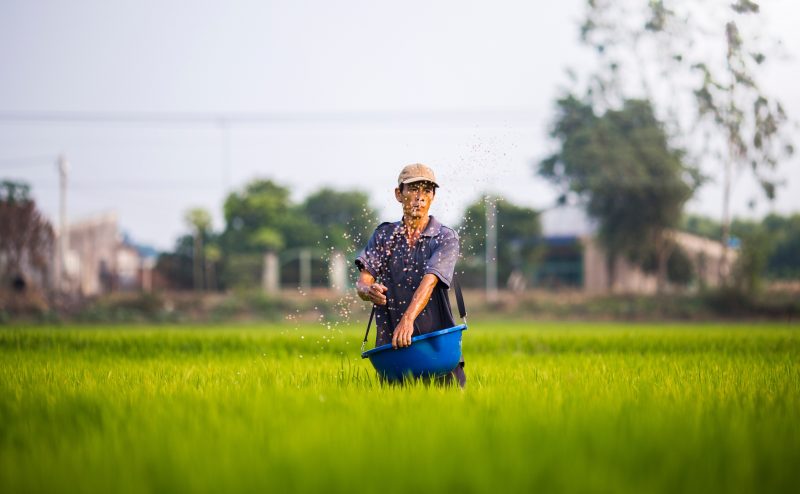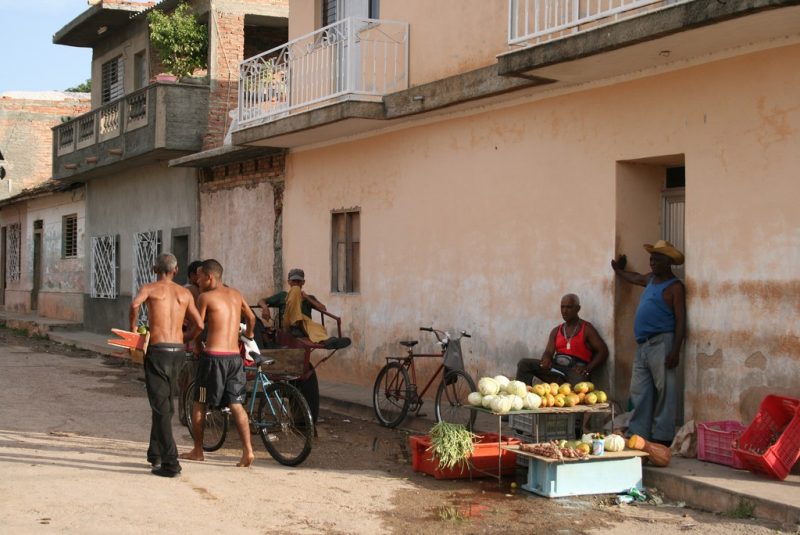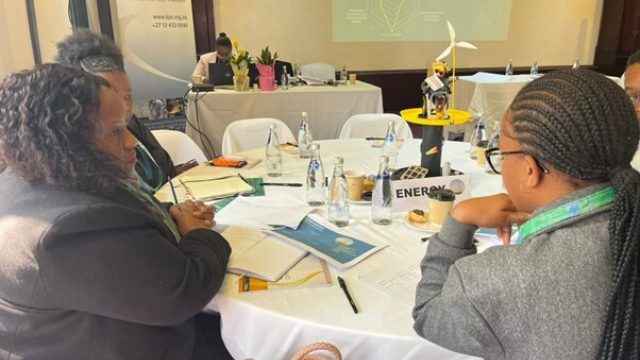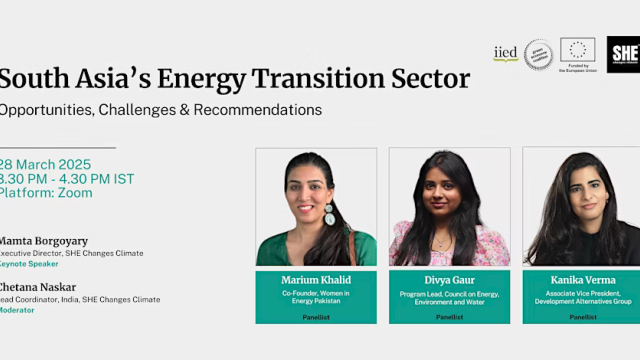Getting a stake in the green transition
Everyone's talking about "inclusion" - but what does it really mean, and why is it important?

With 2019 marking the Green Economy Coalition’s 10-year anniversary, we're ready to launch a progressive new agenda for green economies around the world. In the run up to our Global Meeting in Cape Town, South Africa, we’re exploring what it means for people to get a stake in the transition to a new, greener economic system.
Read the GEC Secretariat’s take on how getting a stake can mean pushing ‘inclusive green economy’ beyond passive ideas of participation and livelihoods, to an empowering agenda of ownership and rights in the new economy.
“Inclusive” is increasingly an adjective for all occasions. Events can be inclusive, priorities can be inclusive, economic reform packages can be inclusive - or at least they aim to be. Everyone from the Pope to the suits at Davos are saying they want to be “inclusive”. It feels like inclusion is everywhere – but what does it actually mean? Is it just another buzzword, some more mealy-mouthed NGO jargon? We at the GEC don’t think so. In fact, we think inclusion is essential and deserves to be taken seriously – so seriously, in fact, that it’s at the heart of everything we do.
For the last ten years we’ve been arguing that you can’t build a truly green economy without first making sure that it’s an equitable, inclusive economy too. But we’re also concerned that for all the recent energy around inclusion, not enough is being done to ensure that inequality is addressed, governments held accountable, and people are empowered.
When the GEC travelled to Rio Earth Summit in 2012, ‘inclusion’ was never the main event. Green economic reform was mostly about solar panels, beyond-GDP, and maybe an electric vehicle or two – decarbonisation, in other words, but with no effort to address underlying economic inequalities. The green economy transition was something to concern governments, progressive business, NGOs; but not actual people. Some even argued that striving for a more inclusive, equitable transition would slow urgent decarbonisation efforts required to tackle climate change.
“ If well-meaning politicians shutter the only job you’ve ever had, its cold comfort to be told that it was based on a brown economic model that couldn’t last anyway.”
But now, barely half a decade later, there’s been an inclusion revolution: from the OECD to CAFOD, ‘inclusive growth’ and ‘inclusive green economy’ are everywhere. This wholesale adoption of inclusion into the language of economic governance is something to be celebrated - but it also poses questions. Is ‘inclusion’ understood in a coherent way by all these different organisations? Are they really addressing inequality, or are they just name-checking inclusion because it’s the flavour du jour? Are we getting closer to building a truly inclusive economy, or further away?
Two kinds of inclusive – voice and livelihoods
At the GEC we know we don’t have all the answers on inclusion, but through our work with in-country partners around the world, we’ve come to understand that there are two different sides to the inclusion-coin that are worth distinguishing.
One aspect is all about voice and participation. You include people in something by giving them a say in how it’s created and engage them in its success. And you take extra care to bring in a wide range of different people – especially those who are often marginalised such as women, disabled, informal workers and other minority groups. Finding the voices of stakeholders who are intersectionally disadvantaged in multiple ways is very important here.
In the context of green economy, this kind of inclusion is traditionally championed by NGOs and activists as a call for meaningful participation in policymaking – meaning that those who are affected by a decision should have the right to be involved in the decision-making process. The idea is that more inclusive policy processes will lead to more accessible and more democratic governance by forcing authorities to be accountable to actual people as early as possible.
But there’s another aspect to inclusion that is equally important, focusing instead on the material side – how livelihoods and income are distributed by policy change. Here, inclusion is very much about outcomes, not process – not how, but who benefits? This technocratic vision of inclusion has risen in prominence as governments around the world grapple with increasingly alienated and resentful citizens, many of whom feel that the benefits of economic growth are being unfairly distributed – be it to outsiders, immigrants or industry fat cats.
Very often, economic policies that are arguably “good for everyone” in the long run still fail to offer immediate benefits to everyone’s lives. If well-meaning politicians shutter the only job you’ve ever had, its cold comfort to be told that it was based on a brown economic model that couldn’t last anyway. “Inclusive growth” increasingly aims to smooth these rough edges of economic reform by trying to make everyone feel like they’re benefiting in their pocket - but it’s not an easy task. Further complicating the issue is the on-going march of globalisation, both of opportunities (trade, international supply chains & jobs) and of threats (climate change, ecological collapse etc).
Unsurprisingly, it is the big INGOs and concerned government ministries that are more sensitive to this framing of inclusion. The policy priorities here are about better ways to share out the economic pie as we tweak the recipe to have less brown and more green ingredients. At the forefront of this agenda is retraining and reskilling brown to green jobs so that as carbon intensive industries close there are new opportunities for people to earn a decent livelihood.

The iconic ‘left behind’ here are workers in fossil-fuel extraction, who tend to be politically opposed to green economy policies, and bear the brunt of sectoral decline in countries where green economy is thriving. Inclusive approaches here aim to meet the ‘skills challenge’ of a mismatch between the old and new economy – with measures like Spain’s retraining, early retirement, and income support for coal-miners.
Even broader than skills and jobs for declining sectors is the question of shifting incentives for everyone – specifically, by pricing carbon. While an increasing number of countries around the world are pricing or taxing carbon, the distributional inclusion question looms large. How can revenues be shared so that the incentives shift, but burdens and benefits are distributed fairly? It’s extremely hard to develop public support for new taxes, as the late 2018 gilet jaunes protests in France have shown.
One way to keep a carbon tax inclusive is through carbon rebates, such as Canada is deploying for its Federal Carbon Levy. By combining rising carbon prices for consumers that pollute most with the offer of cash rebates for others, most people are net-beneficiaries of the policy. In the long run, pricing and rebates can be geared so that the cash gains of going green become clearer (or staying brown, even more severe) – but initially (and crucially) most people benefit.
Enter ‘getting a stake’
For the GEC, it’s essential that the green economy transition provides people with both these kinds of inclusion: voice and benefit. People from all across society need a voice in shaping the contours of the new economy, as well as a clear sense that normal people and families will benefit from the policies being introduced. The question for us is “How can we cover both kinds of inclusion at the same time?”
Our answer is to give people a stake in the new, green economy via policies that secure peoples’ rights and ownership. A rights and ownership approach to inclusion pushes power and agency down to as many people as possible, and aims to make the green economy transition an optimistic, aspirational vision of a prosperous common future.
“ A truly inclusive green economy must leverage citizen involvement, developing wider political support, and see inclusion as an accelerator of change. ”
But what does this mean in practice though? We don’t have all the answers, but via our partners we see a progressive inclusivity agenda focusing on the right to income, right to consultation, the right to own a share in your local community, and the right to invest and support common projects with social & environmental benefits.
Everyone knows green transition is going to require new green infrastructure - be it low emission vehicles, mass transport, or renewable energy generation. But the further question is who will own and profit from all this new investment? If it’s just a bunch of large unaccountable corporations focussed on maximising shareholder value rather than creating shared prosperity and protecting the planet, then the new economy won’t be very different from the old one.
But the distributed nature of most green infrastructure projects means that they could just as easily be owned by local citizen collectives. Renewable energy is particularly well suited to this model, and Germany’s ‘Energiewende’ transition has involved the proliferation of citizen-owned energy cooperatives that have put locals at the heart of decision-making and returned profits to the community. People generate a real sense of ownership – even pride – in their new wind turbines and solar farms, helping to curb NIMBYism and speed deployment.
In addition to being open to new models of ownership, we also need the green economy to consider different ways of doing business. The green economy transition won’t happen without private sector investment, but sustainable businesses must pay heed to the priorities of their employees and the wider society. Worker co-determination and representation on corporate boards can help employees feel they have a stake in the companies they work for – and make those companies more socially responsible in return.
And this is just as true for small business as well – they need ways of benefiting from the social and environmental good they do, such as via policies that recognise and support local green enterprise and social entrepreneurship. Empowering people to become entrepreneurs and innovate solutions in their communities that support their environment puts people in control of their own green economy transition – they just need recognition of the value they create beyond profit to get started and drive the green economy.

For people who have no stake the current economy, inclusion via ownership and rights might mean new forms of social protection that help them when they’re down while also rewarding sustainable management of local environment. Conditional social transfers, geared in the right way, can align environmental and social goals in new and innovative ways.
These policy approaches are just a start, but they illustrate how a truly inclusive green economy could leverage citizen involvement, developing wider political support, and see inclusion as an accelerator of change.
Collaboration - what comes next?
Of course, it’s (relatively) easy to diagnose the problem, but much harder to put these solutions into effect. Inclusion is essential to the green economic transition: you can’t just impose a new economy on people, or they will instinctively reject it, even if it would benefit them in the long run. By finding solutions that give citizens a real stake in the transition, we want to build support for new policies that are genuinely responsive to real people’s needs and deliver benefits across society. We should remember that offering people a stake via rights and ownership isn’t new. All we’re suggesting is that green economy needs to prioritise its own version of the ‘a mule and an acre’ – policies that offer people a stake in a shared endeavour, and the opportunity to take it up and shape it themselves.
That’s why the Green Economy Coalition is building a broad base of collaborators – from governments to civil society, private companies to activists. We’re bringing to light best practice on policies from around the world, trying to understand what works and what doesn’t, and helping people engage with the transition together. We’re building a narrative of the green economy – what it is, why it’s needed, and how we get there – and campaigning to see that vision realised at street level and in the corridors of power. We hope you’ll get involved.
- Chris Hopkins, Policy Manager, GEC
Photos by Dương Trí and Edwin Andrade on Unsplash


